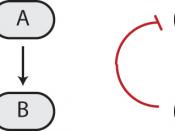Learning a second language could cause many problems, which could sometimes end up refusing to learn that certain language. This phenomenon could be called as 'fossilization.' In order to avoid such effect, applying Chomsky's theory may be suitable to alleviate the problem when learning a second language.
Chomsky (1959) suggested that when children speak, many of what they say is incorrect. Parents or other people around them, however, do not correct the grammar, but instead, correct the meaning of the sentence. In this way, "children do not receive enough negative feedback from other people about these inappropriate language forms (negative evidence) to be able to discard them" (Chomsky, 1959, pg.5). This enables them to learn the language without any hesitation. Then, children set their own parameter, which is learnt through experience or exposure to the language. Once this is set, the person would never forget. Chomsky stated that language is innate or internal.
Considering Chomsky's theory in the situation of learning a language, it could be useful when learning a second language, not just for children. Having ones own natural language, there always appears a wall when learning a second language. The difference between the two languages could refrain one from learning, causing fossilization. There are two factors that influence fossilization; internal and external factors. Internal factor is age or acculturation, whereas external factor is the pressure from others, lack of learning opportunity, or the feedback. Here, feedback could be referred to as what Chomsky said about how children learn their native language.
Once fossilization appears, it is hard to learn the second language. One of the reason fossilization occurs is because of negative feeback. When a negative feed back is given at the point when mistake is made, this brings the feeling of not wanting to learn the language,


